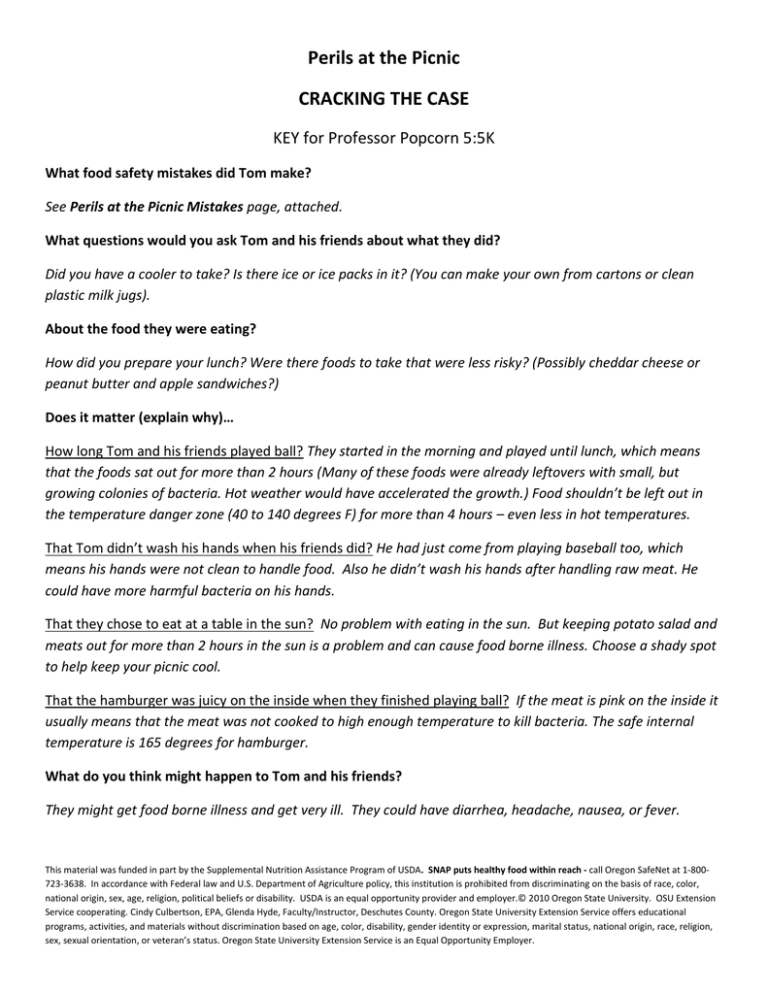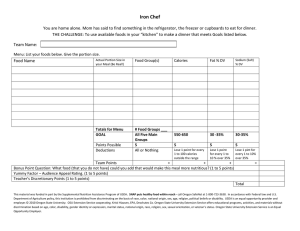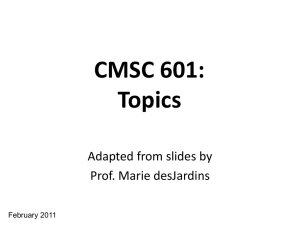Perils at the Picnic Cracking the Case Key
advertisement

Perils at the Picnic CRACKING THE CASE KEY for Professor Popcorn 5:5K What food safety mistakes did Tom make? See Perils at the Picnic Mistakes page, attached. What questions would you ask Tom and his friends about what they did? Did you have a cooler to take? Is there ice or ice packs in it? (You can make your own from cartons or clean plastic milk jugs). About the food they were eating? How did you prepare your lunch? Were there foods to take that were less risky? (Possibly cheddar cheese or peanut butter and apple sandwiches?) Does it matter (explain why)… How long Tom and his friends played ball? They started in the morning and played until lunch, which means that the foods sat out for more than 2 hours (Many of these foods were already leftovers with small, but growing colonies of bacteria. Hot weather would have accelerated the growth.) Food shouldn’t be left out in the temperature danger zone (40 to 140 degrees F) for more than 4 hours – even less in hot temperatures. That Tom didn’t wash his hands when his friends did? He had just come from playing baseball too, which means his hands were not clean to handle food. Also he didn’t wash his hands after handling raw meat. He could have more harmful bacteria on his hands. That they chose to eat at a table in the sun? No problem with eating in the sun. But keeping potato salad and meats out for more than 2 hours in the sun is a problem and can cause food borne illness. Choose a shady spot to help keep your picnic cool. That the hamburger was juicy on the inside when they finished playing ball? If the meat is pink on the inside it usually means that the meat was not cooked to high enough temperature to kill bacteria. The safe internal temperature is 165 degrees for hamburger. What do you think might happen to Tom and his friends? They might get food borne illness and get very ill. They could have diarrhea, headache, nausea, or fever. This material was funded in part by the Supplemental Nutrition Assistance Program of USDA. SNAP puts healthy food within reach - call Oregon SafeNet at 1-800723-3638. In accordance with Federal law and U.S. Department of Agriculture policy, this institution is prohibited from discriminating on the basis of race, color, national origin, sex, age, religion, political beliefs or disability. USDA is an equal opportunity provider and employer.© 2010 Oregon State University. OSU Extension Service cooperating. Cindy Culbertson, EPA, Glenda Hyde, Faculty/Instructor, Deschutes County. Oregon State University Extension Service offers educational programs, activities, and materials without discrimination based on age, color, disability, gender identity or expression, marital status, national origin, race, religion, sex, sexual orientation, or veteran’s status. Oregon State University Extension Service is an Equal Opportunity Employer.




